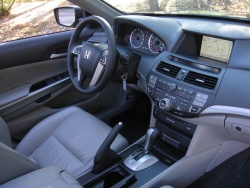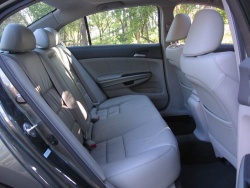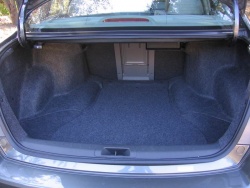

2009 Honda Accord EX-L. Click image to enlarge |
In 2008, the most fuel-efficient Accord model, according to Natural Resources Canada estimates, was a four-cylinder with manual transmission, with ratings of 9.4/6.4 L/100 km (city/highway). A four-cylinder with automatic was rated 9.9/6.5, and the V6’s numbers were 11.0/6.7 L/100 km. Fuel economy improved notably in 2011, to 8.8/5.8 L/100 km with four-cylinder engine and manual transmission, or 9.0/5.8 with the automatic, and the V6 model was rated at 10.3/6.5 L/100 km. A V6/stick-shift coupe was rated 12.2/7.8 L/100 km from 2008 through 2010, and the 2011 and 2012 versions were rated 11.9/7.6.
Consumer Reports gives 2008 and 2009 Accords an average used vehicle reliability rating, but boosts that to above average for 2010 and 2011 models. CR lists the Accord as a used vehicle “good bet.” It knocks points off mostly for the brake wear and interior rattle problems, both of which are well documented and, more than anything, frustrating for owners of these cars. TrueDelta.com shows the Accord to be one of the most reliable cars in its class, right up there with the Toyota Camry.
Honda issued a technical service bulletin to address a rattling sound from the engine at cold starts, caused by a faulty VTC actuator (a component of the iVTEC variable valve timing system). Here’s a discussion on the topic at DriveAccord.net.
Honda issued a different service bulletin to deal with excessive oil consumption in V6 engines with the VCM system.
Honda settled a class-action lawsuit over excessive rear brake wear in the eighth-generation Accord, reputedly caused by the calibration of the car’s electronic brake force distribution system.
Here’s a discussion at Honda-Tech.com about excessive oil consumption in four-cylinder Accords. There’s no empirical evidence to show this is the result of a serious design flaw, so take it with a grain of salt.

2009 Honda Accord EX-L. Click image to enlarge |
Unsurprisingly, the Accord is one of priciest used family sedans available; Canadian Black Book sets the value for a 2010 Accord LX slightly higher than that of a 2010 Toyota Camry LE (mostly because the Accord’s MSRP was a bit higher). A Hyundai Sonata GL, Mazda6 GS, and Chevrolet Malibu LT are each less expensive by more than $3,000, and a Dodge Avenger SXT is nearly $6,000 cheaper.
Consumer Reports reliability data shows that interior squeaks and rattles are common in the eighth-generation Accord; TrueDelta.com gets a little more specific, suggesting that most of the complaints are related to rattles from the rear parcel shelf.
Honda’s had a rough go of things lately, what with lukewarm critical opinions of new models, production disruptions caused by the 2011 tsunami, and a few sales duds. And even though the Accord went through its own tough luck a number of years ago thanks to automatic transmission problems, it seems like this benchmark-setting sedan is back on its game. Still, shop carefully for a car that has had all applicable technical service bulletin work taken care of by a previous owner.
|
Pricing
Black Book Pricing (avg. retail) April, 2012:
|
Year
|
Model
|
Price today
|
Price new
|
|
2011
|
Accord SE sedan w/auto trans
|
$24,675
|
$25,990
|
|
2010
|
Accord LX sedan w/auto trans
|
$20,150
|
$25,990
|
|
2009
|
Accord LX sedan w/auto trans
|
$16,825
|
$26,290
|
|
2008
|
Accord LX sedan w/auto trans
|
$15,075
|
$26,290
|
Online resources
- Start your search at DriveAccord.net; this is the best Accord-specific site I was able to find. You should be able to find what you need there, but if you want to try for second opinions, you can also try HondaTech.com and CRXSI.com, though these sites don’t consolidate either troubleshooting information or eighth-generation Accord information. HondaAccordForum.com and V6Performance.net look like they might be useful, if not quite as promising as DriveAccord.net. The also-rans include HondaUnited.com, CordClub.com, and TheAccordForums.com.
Recalls
- Transport Canada Recall Number: 2009340; Units affected: 962008–2009:Certain accessory nose masks may impede operation of the hood secondary latch. Without secondary latch function, a hood that has not completely closed (because the primary latch has not been engaged) may lift up while the vehicle is being driven, compromising the driver’s ability to see the road and its users. This could result in a vehicle crash causing property damage, personal injury, or death. Correction: Dealers will replace the nose mask with an updated version.
- Transport Canada Recall Number: 2011286; Units affected: 135,142 (includes other models)2008–2010:On certain vehicles, the secondary shaft bearing in the automatic transmission may fail. This could cause abnormal noise, the malfunction indicator lamp to turn ON, and allow contact between the transmission idle gear and an electronic sensor housing within the transmission, resulting in a short circuit that causes the engine to stall. Engine stalling would result in lost vehicle propulsion, which, in conjunction with traffic and road conditions and the driver’s reactions, could increase the risk of a crash. Additionally, broken pieces may become lodged in the parking pawl resulting in the vehicle rolling after the driver has placed the gear selector in the PARK position. These issues could result in property damage and/or personal injury. Correction: Dealers will update the automatic transmission control module software.
Transport Canada Recall Number: 2012031; Units affected: 59 (includes other models)
2012:On certain vehicles, the side curtain airbag inflators may have been incorrectly manufactured and, as a result, one or both airbags may not deploy as intended. Failure of a side curtain airbag to deploy during a crash (where deployment is warranted), could increase the risk of personal injury to the seat occupant. Correction: Dealers will inspect and, if necessary, replace one or both side curtain airbag assemblies.
Crash test results
- National Highway Traffic Safety Administration (NHTSA)
- Insurance Institute for Highway Safety (IIHS)Used vehicle prices vary depending on factors such as general condition, odometer reading, usage history and options fitted. Always have a used vehicle checked by an experienced auto technician before you buy.For information on recalls, see Transport Canada’s web-site, www.tc.gc.ca, or the U.S. National Highway Transportation Administration (NHTSA)web-site, www.nhtsa.dot.gov.For information on vehicle service bulletins issued by the manufacturer, visit www.nhtsa.dot.gov.
For information on consumer complaints about specific models, see www.lemonaidcars.com.
|














